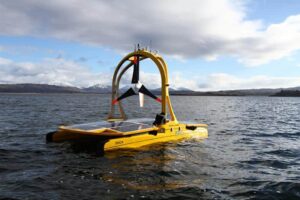SeeByte, a provider of software solutions for unmanned maritime systems, have announced that they have been awarded a contract by the Small Business Research Initiative (SBRI). This contract is to undertake work in collaboration with Autonomous Surface Vehicles (ASV), a manufacturer of unmanned marine systems, and the Marine Biological Association of the UK. The work seeks to provide a flexible Autonomy Framework for the range of oceanographic and environmental scenarios outlined in the SBRI’s call for development of Adaptive Autonomous Ocean Sampling Networks.
The project, funded by the Natural Environmental Research Council (NERC), Innovate UK and the Defence Science and Technology Laboratory (DSTL), aims to provide an open software tool-set and user interface that will enable improved use of autonomous systems for scientific research. Using SeeByte’s SeeTrack Neptune, which already forms the basis of UK Maritime Autonomy Framework (MAF), the intended outcome is for autonomous maritime systems to adapt and change to the external environment and mission requirements. The initial target platform will be ASV’s C-Enduro vehicle, managed by the UK’s National Oceanography Centre.
Chris Haworth, Business Development Manager at SeeByte commented “At SeeByte we are delighted to received funding from SBRI for this project. We believe at SeeByte that autonomous systems have the potential to completely change how marine operations are conducted and become the vehicle of choice for a wide range of functions”.
SeeTrack Neptune is an adaptive planning tool for optimising the execution of AUV operations. It supports high-level goal-based mission descriptions and allows the matching of mission requirements against vehicle(s) capabilities. SeeTrack Neptune also includes behaviours capable of adapting the mission based on changes in the environment, assets and mission objectives – benefits which will be useful for future unmanned operations.



















